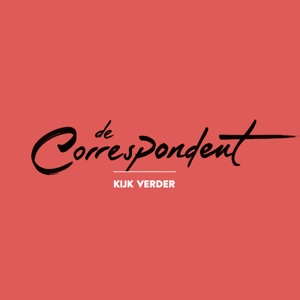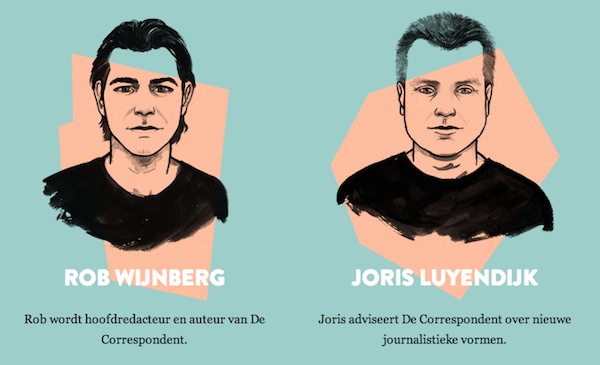 Rob Wijnberg thought his chances were 50/50. Getting 15,000 people to pledge €60 for a one-year susbscription to an news site that didn’t yet exist was never a given.
Rob Wijnberg thought his chances were 50/50. Getting 15,000 people to pledge €60 for a one-year susbscription to an news site that didn’t yet exist was never a given.
On March 18, Wijnberg, former editor-in-chief of the young-adult-targeted newspaper nrc.next, proposed his idea for a new online journalism platform on Dutch national television. Within 24 hours, his team had raised half its goal, and after eight days, Wijnberg got an earlier than expected go-ahead: 15,000 had subscribed, and many had added donations on top of their subscription fee. In just over a week, in a small country, the Dutch crowdfunding project De Correspondent had raised over €1 million (about $1.3 million).
De Correspondent’s record-breaking campaign is remarkable, not least because even those paying up aren’t clear on what the platform will look like when it launches in September. “That’s for a very good reason,” Wijnberg said — “we don’t really know yet.”
“When you try to sell an idea, it’s very easy to refer to what people know — ‘the platform looks like this, and you can compare the writing style with that’,” he said. “We didn’t want to do that, because we really wanted to be able to create something new — start with a clean slate.”
Here’s what we do know about De Correspondent: It promises to break away from the daily news cycle by focusing on context, not just what happened in the past 24 hours — new content that isn’t driven by “the news.” Individual correspondents, many of them famous or semi-famous in the Netherlands, will lead as “guides” — deciding the news agenda, and making their choices explicit.
Take, for example, Jelle Brandt Corstius, one of the correspondents signed up. He’s known in the Netherlands for his television series on Russia and India. “My core business will be to study one place in the Netherlands every month,” he said. “This might be a place where the news circus has already left, but it could also be a place where something interesting is happening at too slow a pace to make it into the news — like the depopulation of a provincial village in Zeeland.”
For an idea of what the new publication might look like, check out its 10-item manifesto (translated into English): Daily, but beyond the issues of the day. From news to new. No political ideology, but journalistic ideals. Themes and interconnections. Journalism over revenues. From readers to participants. No advertisers, but partners. No target groups, but kindred spirits. Ambitious in ideals, modest about wisdom. Fully digital.
De Correspondent will be online only — at least for the foreseeable future. Joris Luyendijk, a banking blogger for The Guardian and advisor for De Correspondent, sees this as an opportunity to break free from the existing DNA of journalism. “The current genres of journalism have been shaped by the restrictions of print and broadcast: the idea of only making one version of the story, making every story stand alone and without a follow-up, and not really allowing stories to build on each other. Because today’s news is tomorrow’s fish wrap,” he said. “If other industries would be this slow with innovating, we as journalists would be very critical of that.”
Luyendijk offers a thought experiment to illustrate his vision for De Correspondent: “Imagine paper would be invented today, and the Internet would have been around for 200 years. I think you’d throw away The New York Times, because you’d think, ‘Why on earth would I constantly read updates of a process that I don’t know anything about?” he said. “Online, you can say, ‘If you’re new, start here and we’ll explain it to you. If you’ve been here before, you’ll probably want to know more about the news.'” Creative agency Momkai is tasked with designing this user experience.

Wijnberg’s concept did not come out of thin air. In September, he unexpectedly left his position at nrc.next, a job he’d held for two years. Parent company NRC Media wanted nrc.next should become “newsier.” (The paper was known to focus more on backgrounds and analysis than hard news. A popular Wijnberg-era section was the fact check, which assessed the validity of one public statement every day.)
Wijnberg disagreed with the change of direction and was forced to leave. He went home, wrote a book about the current state of the news media, and several months later launched De Correspondent. His book provides much of the philosophical backdrop for the project. “I don’t believe in ‘the news’ in the objective sense of the word,” he said. “You can describe the world in infinite ways, and ‘the news’ happens to be one of them.”
Wijnberg adds: “I want the correspondents to make their choices explicit — what do they think is important, and why should readers care about it? You do that by making clear that you’re not following an objective news agenda, but a subjective journey through the world.”
With such ambitious plans, Wijnberg is realistic about the reach of his newly acquired funding. “In terms of crowdfunding, this is spectacular of course. But for practicing good journalism, this is just a small beginning.” Two core strategies aim to make the platform financially sustainable. “One: Make something really good — that’s the most important thing,” Wijnberg said. “This sounds like stating the obvious, but whether you’re crowdfunded or not, your product must continue to be worth people’s money.”
The second strategy is forming partnerships. This could be anything from joint production of journalistic content, to donations from foundations, to help with the technological side of the platform. Wijnberg’s main condition: “We want to be able to put the terms of the partnership online, so our readers can see our content is independent from the organizations that we work with.”
De Correspondent has caused quite a stir in Dutch media, and attracted some criticism. Several spoofs were erected; De Verslaggevert (“The Reportert”) raised a total of €90 to spend a year thinking about a business plan and deliver a “completely unknown journalistic surprise.” One prankster made a duplicate of De Correspondent’s website (at decorrespondent.org instead of .nl) which claimed that Wijnberg’s project had been an April Fools’ joke — a social experiment to answer the question “How much money can you raise on empty promises?”
One prevalent point of critique was that Wijnberg’s correspondents were an elitist club of celebrity journalists. They include a former leader of the Dutch GreenLeft party, a well-known novelist, and several journalists who make regular TV appearances. The reproach irritated Luyendijk. “If you say, ‘Hey, we’re seven people you don’t know, will you give us €60?’ — that won’t work,” he said. “Besides, the people who aren’t as far in their careers yet couldn’t publicly commit to the project before we knew we got the money.”
At the time of writing, De Correspondent has 17,323 subscribers, and counting. “I always thought proof for the necessity of this project would be provided by the reactions to it,” Luyendijk said. “It’s hopeful to have 17,000 people say, ‘Here’s some money — now go figure something out.'”